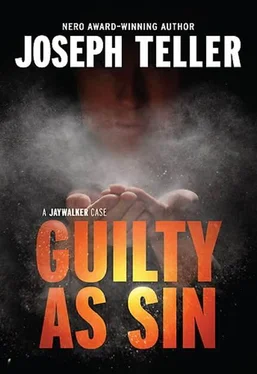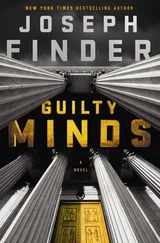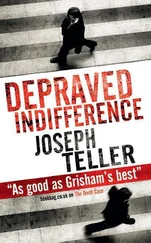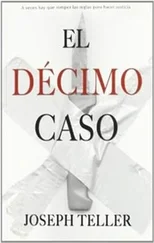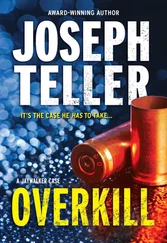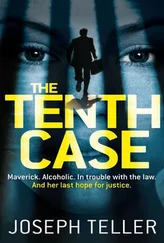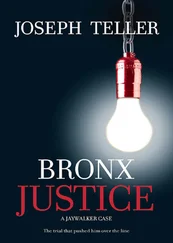Joseph Teller - Guilty As Sin
Здесь есть возможность читать онлайн «Joseph Teller - Guilty As Sin» весь текст электронной книги совершенно бесплатно (целиком полную версию без сокращений). В некоторых случаях можно слушать аудио, скачать через торрент в формате fb2 и присутствует краткое содержание. Жанр: Криминальный детектив, на английском языке. Описание произведения, (предисловие) а так же отзывы посетителей доступны на портале библиотеки ЛибКат.
- Название:Guilty As Sin
- Автор:
- Жанр:
- Год:неизвестен
- ISBN:нет данных
- Рейтинг книги:5 / 5. Голосов: 1
-
Избранное:Добавить в избранное
- Отзывы:
-
Ваша оценка:
- 100
- 1
- 2
- 3
- 4
- 5
Guilty As Sin: краткое содержание, описание и аннотация
Предлагаем к чтению аннотацию, описание, краткое содержание или предисловие (зависит от того, что написал сам автор книги «Guilty As Sin»). Если вы не нашли необходимую информацию о книге — напишите в комментариях, мы постараемся отыскать её.
Guilty As Sin — читать онлайн бесплатно полную книгу (весь текст) целиком
Ниже представлен текст книги, разбитый по страницам. Система сохранения места последней прочитанной страницы, позволяет с удобством читать онлайн бесплатно книгу «Guilty As Sin», без необходимости каждый раз заново искать на чём Вы остановились. Поставьте закладку, и сможете в любой момент перейти на страницу, на которой закончили чтение.
Интервал:
Закладка:
Back in the pens, Jaywalker had his second sit-down interview with Barnett. This one would take on a bit more urgency than the first, if only because of the ultimatum delivered by Daniel Pulaski’s note. While threats to withdraw plea offers were often no more than that-threats-Jaywalker couldn’t put it past Pulaski to follow through on his. What difference would it make to him if some defendant ended up with a fifteen-year minimum instead of an eight year one? So Jaywalker didn’t mince words.
“If you ever want to take a plea, next time is the time to do it,” he said. “I don’t trust this D.A. to keep the offer open past then. I really don’t.”
Barnett seemed to think for a moment, and Jaywalker half expected him to say, “Okay, we’ll do it next time.” After all, he hadn’t once said, “I’m not guilty” or “I didn’t do it” or anything along those lines. In fact, at their first meeting, he’d made a point of admitting that the charges against him were true, every word of them. But what Jaywalker hadn’t learned yet was that unlike most defendants, and for that matter most people, Alonzo Barnett was never quick to answer a question of any sort. Not that he stalled before replying or repeated the question aloud in order to buy time. No, Jaywalker would come to understand, it was simply a matter of Barnett’s taking a moment to think before responding. A rare thing indeed.
“To tell you the truth,” he finally said, “I don’t intend to take a plea. If that’s all right with you.”
“Of course it’s all right with me,” said Jaywalker. “But it brings us to another issue.”
“What’s that?”
“Well,” said Jaywalker, “you’ve been around long enough to know that the chances of beating a direct sale case aren’t very good.” A direct sale meant one in which the buyer was an undercover cop or agent, as opposed to an observation sale, where the authorities claimed to have witnessed a transaction between a seller and a buyer, both of whom were civilians.
Barnett nodded but didn’t say anything. Not only had he been around long enough to know that Jaywalker was speaking the truth, but his record of guilty pleas suggested he understood the odds.
“So,” continued Jaywalker, “it might be a good idea if we spent a few minutes talking about the facts of your case.”
“Fair enough,” said Barnett.
“Why don’t you tell me what happened.” It wasn’t a question on Jaywalker’s part so much as an invitation. Nor was it something he always asked of a defendant, particularly in a sale case. Strange as it may sound, sometimes a lawyer and client talk about everything but the facts. There are times, for example, when they both know the defendant has done precisely what he’s accused of but on the one hand doesn’t want to lie to his lawyer or come right out and admit his guilt on the other. So without ever saying so, they agree to ignore it and spend their time dancing around it, the elephant in the room. Or, in this particular instance, the elephant in the cell.
Again, Barnett took his time before answering. When finally he did, he spoke only four little words. They added up to neither an admission of guilt nor a denial, but rather an explanation for his behavior. In no way did they amount to a legal defense, the way they might have had he said, for example, that he’d been forced into doing what he’d done, or coerced, or that he’d been insane at the time, or that he hadn’t realized that it had actually been heroin he’d sold to the undercover agent.
Believe it or not, Jaywalker had once won a case on just such a theory. His client had been making a living by “beating” his customers, selling them supermarket-bought spices at marijuana prices. When the cops had examined the evidence they’d bought back at the station house, they’d realized they too had been victimized. So they’d simply sprinkled some of their own emergency stash into the ounce they’d bought, enough to convince the police chemist. But not the jury. Not once had Jaywalker insisted upon having an independent analysis conducted. The sample came back two percent cannabis, eighty percent oregano and eighteen percent basil. Highly aromatic stuff, perhaps, but hardly the kind to get high on.
No, Alonzo Barnett’s four words of explanation fell far short of that standard. And when he uttered them, they initially struck Jaywalker as being not only legally worthless but pretty insignificant in terms of moral culpability, as well. Then again, he was at something of a disadvantage. For as he listened to them, he had yet to hear Alonzo Barnett’s story. He had absolutely no way of knowing just how fertile with possibility the words were, or how in time they would germinate, take root, sprout and grow into a full-fledged defense, the likes of which Jaywalker would never have dared to even dream about, sitting there in the pens of 10 °Centre Street, back on that Thursday morning in May of 1986.
“I did a favor,” is all Alonzo Barnett said.
4
The fact that he took a moment to think before answering a question in no way meant that Alonzo Barnett couldn’t tell a story. He could, and for the next half hour he spoke almost without pause or interruption. So articulate was he and so riveting was his story that Jaywalker dared to break into it only once or twice, seeking some minor clarification here or amplification there. Other than that, it was Barnett’s story, told in his own words and his own voice.
When he’d arrived at Green Haven in the mid-1970s to begin serving the latest of his prison sentences, Barnett had been accompanied, as all inmates were, by a jacket. A jacket, at least in prison parlance, isn’t something you wear. It’s your file, containing a certified copy of your conviction, your indictment, your presentence investigation report, your entire criminal record, your photograph and your fingerprint card. All of that is kept in a folder, or jacket, to keep it private and confidential.
But “private” and “confidential” are concepts that simply don’t exist within prison walls. With guards on the take and inmates assigned to work as clerks in receiving, classification and records, every detail about an inmate’s past is not only visible to prying eyes but is currency. And with respect to Alonzo Barnett, there were two details that stood out.
The first was that at age twenty-two, Barnett had been arrested and convicted for the felonious forcible rape of a fifteen-year-old girl. Never mind that the two of them had been in love and already had a child together, that there’d been absolutely no force involved or threatened, and that they would get legally married three years later. Or that in order to resolve the matter quickly and inexpensively, Barnett had waived his right to counsel, pleaded guilty to statutory rape as a misdemeanor and paid a twenty-five-dollar fine. If you’d opened Barnett’s jacket, all you would have seen were the initial felony charge of forcible rape of a fifteen-year-old female and the fact that the arrest had resulted in a conviction.
The second thing you would have found, had you taken the trouble to read the indictment handed up in the case that had most recently landed Barnett in Green Haven, was that in addition to the usual counts of sale and possession, there was, way down at the very bottom of the list, a charge that had been added to the Penal Law only recently. “Sale of a Controlled Substance in the fourth degree upon school grounds” it read. Once again, the dire official language masked a far more innocent reality. The legislature, it turned out, had defined “school grounds” in such a way as to include “any area accessible to the public located within 2,500 feet of the boundary of any public or private elementary, parochial, intermediate, junior high, vocational or high school.” In other words, anywhere within nearly half a mile of any such place. In Manhattan, that translated into a nearly ten-block radius, resulting in just about anyplace in the borough qualifying as school grounds. The law has since undergone several amendments, and the 2,500-foot zone is these days down to a slightly more reasonable 1,000. But labels being what they are, the charge made it look and sound as though Alonzo Barnett had set up shop in the playground and started handing out free samples of drugs to kindergarten kids.
Читать дальшеИнтервал:
Закладка:
Похожие книги на «Guilty As Sin»
Представляем Вашему вниманию похожие книги на «Guilty As Sin» списком для выбора. Мы отобрали схожую по названию и смыслу литературу в надежде предоставить читателям больше вариантов отыскать новые, интересные, ещё непрочитанные произведения.
Обсуждение, отзывы о книге «Guilty As Sin» и просто собственные мнения читателей. Оставьте ваши комментарии, напишите, что Вы думаете о произведении, его смысле или главных героях. Укажите что конкретно понравилось, а что нет, и почему Вы так считаете.
